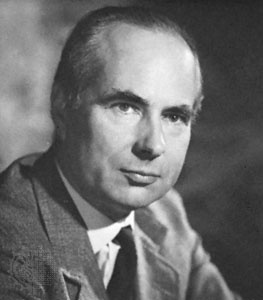Huxley, Sir Andrew Fielding
British physiologist
born Nov. 22, 1917, Hampstead, London, Eng.
 English physiologist, cowinner (with Sir Alan Hodgkin (Hodgkin, Sir Alan) and Sir John Carew Eccles (Eccles, Sir John Carew)) of the 1963 Nobel Prize for Physiology or Medicine. His researches centred on nerve and muscle fibres and dealt particularly with the chemical phenomena involved in the transmission of nerve impulses. He was knighted in 1974 and was president of the Royal Society from 1980 to 1985.
English physiologist, cowinner (with Sir Alan Hodgkin (Hodgkin, Sir Alan) and Sir John Carew Eccles (Eccles, Sir John Carew)) of the 1963 Nobel Prize for Physiology or Medicine. His researches centred on nerve and muscle fibres and dealt particularly with the chemical phenomena involved in the transmission of nerve impulses. He was knighted in 1974 and was president of the Royal Society from 1980 to 1985.Andrew Fielding, a grandson of the biologist T.H. Huxley and son of the biographer and man of letters Leonard Huxley, received his M.A. from Trinity College, Cambridge, where later, from 1941 to 1960, he was a fellow and then director of studies, a demonstrator, an assistant director of research, and finally a reader in experimental biophysics in the Department of Physiology. In 1960 he went to University College, London, first as Jodrell professor and then, from 1969, as Royal Society research professor, in the Department of Physiology. Huxley and Hodgkin's researches were concerned largely with studying the exchange of sodium and potassium ions that causes a brief reversal in a nerve cell's electrical polarization; this phenomenon, known as an action potential, results in the transmission of an impulse along a nerve fibre. Apart from the researches directly mentioned in the Nobel citation, Huxley made contributions of fundamental importance to knowledge of the process of contraction by a muscle fibre. He published many important papers in periodicals, particularly in the Journal of Physiology. His Sherrington Lectures were published as Reflections on Muscle (1980).
- 1980-96, Table Annual Average Rates of Growth of Manufacturing Output
- 1983 Beirut barracks bombings
- 1989-92 Pattern of Output, Table
- 1989-92, Table Pattern of Output
- 1990-93 Pattern of Output, Table
- 1990-93, Table Pattern of Output
- 1991-94 Pattern of Output, Table
- 1991-94, Table Pattern of Output
- 1991*, Table World Fisheries
- 1991* World Fisheries, Table
- 1992{1}, Table World Fisheries
- 1992{1} World Fisheries, Table
- 1992-95 Pattern of Output, Table
- 1992-95, Table Pattern of Output
- 1993{1}, Table World Fisheries
- 1993{1} World Fisheries, Table
- 1993-96 Pattern of Output, Table
- 1993-96, Table Pattern of Output
- 1993, Table Top 10 Species Landed
- 1993 Top 10 Species Landed, Table
- 1995 Manned Spaceflights
- 1995 Top 20 Species Landed
- 1995 World Fisheries
- 1996 Manned Spaceflights
- 1997 Earth Perthelion and Aphelion